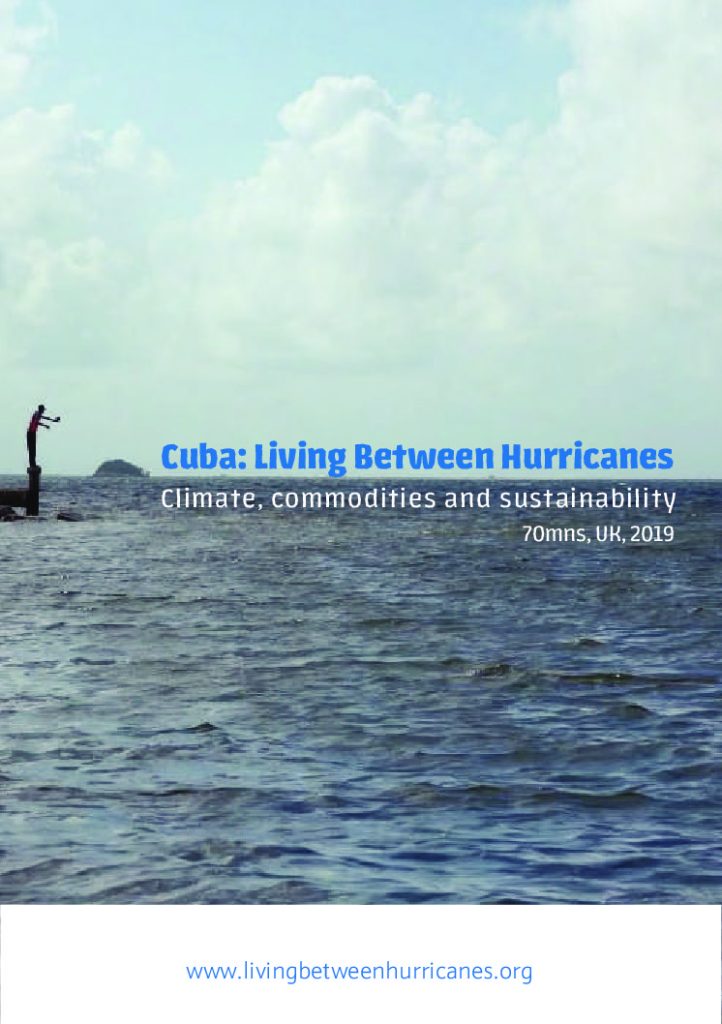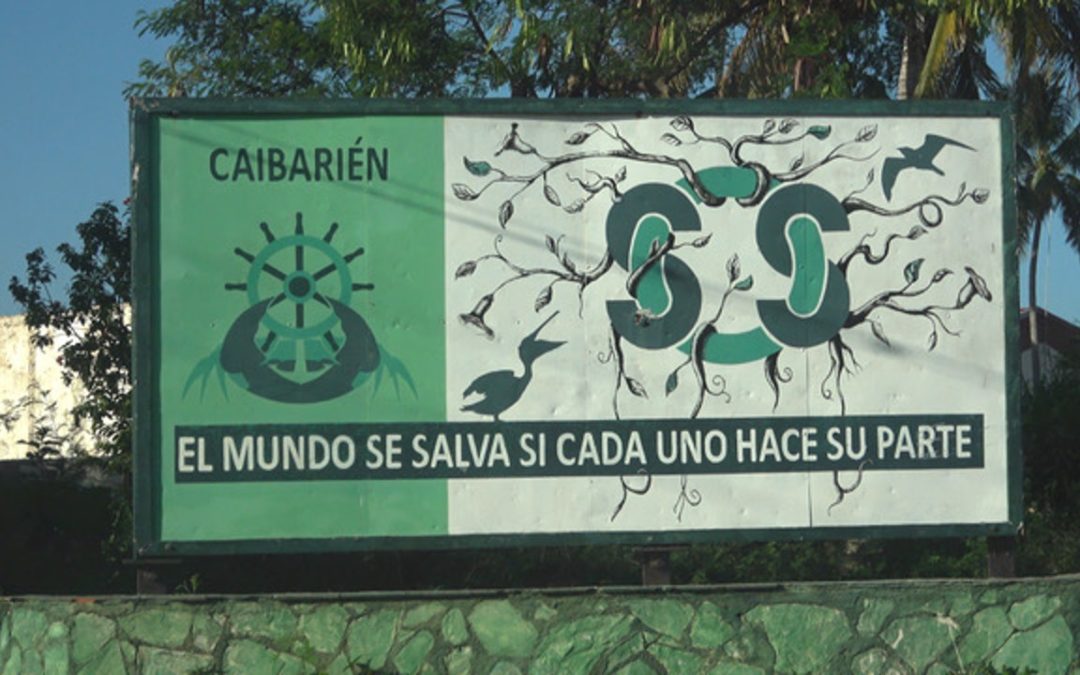By Jean Stubbs, Research Fellow, Institute of Latin American Studies
“Some compare what’s coming with a category 5 hurricane.”
Among the many challenges Covid-19 has thrown our way has been having to adapt to online screenings followed by Q&A for our new documentary Cuba Living Between Hurricanes. Back in September 2017, category 5 Hurricane Irma made landfall in Caibarién on the north-central coast of Cuba. As news reached us, Jonathan Curry-Machado and I were planning a documentary to explore the historical and contemporary linkages between commodity frontiers and environmental change, with a view to sustainable futures – part of the audio-visual strategy of our Commodities of Empire British Academy Research Project (CoE), based at ILAS. We knew Caibarién well from previous research and started working with filmmaker Michael Chanan (Roehampton). In 2018, we were awarded AHRC-funding to broaden the CoE network of global scholars through filming a pilot documentary in collaboration with the Havana-based Antonio Nuñez Jiménez Foundation for Nature and Humanity (FANJ) and Cuban Film Institute (ICAIC), and Caibarién cultural and environmental activist Pedro González Reinoso. We filmed during 2019, launched the finished documentary during last December’s Latin American Film Festival, made it freely available on the film’s website, and planned 2020 screenings.

Then Covid hit, and, once it became clear it wasn’t going away soon, like many others we began to make virtual plans. To date, we have now had three screenings and Q&A, for two of which we were joined by Reinaldo Funes, our key Cuban interlocutor at FANJ, first from Yale University and then from Miami, where he is still waiting for a flight back to Cuba. The first screening in June was part of the series ‘Latin America: Crisis and Coronavirus’, hosted by colleagues in Sheffield and joined by some 50 viewers. The second in early July was with 50 international students on the Erasmus European Master in Global Studies hosted by the University of Leipzig and moderated by Eric Vanhaute at the University of Ghent. The third was hosted in London on 26 July by Olivier Stockman of Sands Films Studio. London-based Cuban writer Pedro Pérez Sarduy opened, sharing personal memories of the memorable date – the anniversary of the 1953 storming of the Moncada Barracks in Santiago de Cuba that went down in history marking the start of the Cuban Revolution, and the online ‘turnout’ was high – 820 in all, 470 on Facebook and 350 on Vimeo.
We set out to make a thought-provoking documentary and questions raised after each screening point to us having done so – especially questions about Cuba today and the impact of Covid bringing tourism to an abrupt halt. Health was not an issue we tackled, though we knew of Cuba’s health record and it came as no surprise that Cuba rose to the Covid challenge at home and sent medics to countries (29 at last count) across the globe. International tourism, which featured centrally in our documentary as Cuba’s most recent commodity frontier, is altogether another question. The toll of the Trump administration further tightening and extra-territorialising the 60-year U.S. embargo on Cuba has been hitting hard – in late 2019 we weren’t sure the Film Festival would go ahead and we’d have our Havana launch due to fuel shortages and power outages – and closing the borders to tourism would inevitably hit harder. Cuba has a long history of commodity exports, with the rise and fall of commodity frontiers linked to social and environmental degradation and a vulnerability to global markets. Like preceding frontiers, tourism since the crisis of the 1990s, while an economic lifeline, has not been without social and environmental costs and is highly susceptible to world market conditions beyond Cuba’s control. Covid showed that with a vengeance, signalling the need for a rethink.
Much of our filming centred around Caibarién in Villa Clara province, and in May 2020 Sanctí Spíritus, in the neighbouring province of the same name, was a regional hotspot for Covid-19. On 18 May, Escambray, the town newspaper, carried an interview by Mary Luz Borrego and Yosdany Morejón with Oscar Luis Hung Pentón, president of the National Association of Economists and Accountants of Cuba, about the economic fallout and options facing Cuba as a result of the pandemic. The reporters began: “Some compare what’s coming with a category 5 hurricane.” They put the economic costs that would be felt worldwide on the magnitude of the 1929 Great Depression, and, with spectacular contractions forecast in developed nations, they asked what chance did Cuba have. A question inevitably raised was the outlook for tourism. Hung Pentón’s reply is worth citing: “Now is the opportunity for an alliance between tourism and health. Cuba needs to develop health tourism more strategically, with linkages to agriculture and industry. I believe tourism can retool to become a model based on nature and health. This is no time for grand hotels with communal pools, restaurants with buffet service, or tourism crowding our towns and cities.”
Two months later, as the Cuban government moved to a phased lifting of Covid lockdown, a two-track strategy was announced allowing domestic tourism on the mainland while restricting international tourism to the natural environment of the offshore keys, with stringent health monitoring. The strategy came with a raft of economic reforms, many agreed a decade ago but not as yet implemented. They include greater autonomy for an expanding domestic private sector, a reinvigorated programme for supporting industrial production and more leasing of land to bolster smallholder agriculture (also featured in our documentary), with stronger linkages between the various sectors, and in an environmentally friendly way.
A tall order at the best of times, which they certainly aren’t right now. As I write this, a Covid resurgence has put Havana back in lockdown, and it’s far too early to know how the reforms will pan out. International aid and investment might, however, have a role to play. Suffice it to note three recent news items involving the UK. The first concerns BioFarma Innovations, a joint venture between BioCubaFarma and British SG Innovations Limited to provide access to Cuba’s patent-protected portfolio of biopharmaceutical products, promote investment in new product development, and enable commercialisation in Europe and the British Commonwealth. Several BioCubaFarma products developed for treating Covid have shown promising results in countries where Cuba has sent help, and BioCubaFarma has other joint ventures in China, Spain, Thailand and Singapore. The second is a report on UK-based Fred Olsen choosing Cuba as its hub for 2021-2022 Caribbean cruises. Cuba came to the rescue of its ship Braemar back in March, when there were Covid cases on board and no other territory in the region would allow it to dock. True to the company’s promise at the time, this would not be forgotten.
The third is on the action plan for Caibarién given government approval earlier this year. It refers to familiar issues raised in the documentary, and also the Coastal Resilience project located there, funded by the European Union (UK included) and UNDP. It ends, however, on a cautionary note: while a strategic direction for developing Caibarién has been charted, how this moves forward “will depend on how the plan is taken up by the authorities, how people are involved, and of course the objective conditions of the country.”
It goes without saying, we’ll be among those closely following developments on all counts!


Recent Comments